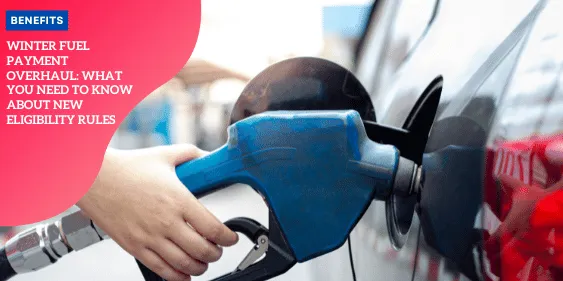Winter Fuel Payment Overhaul: What You Need to Know About New Eligibility Rules

This year brings a notable shake-up in the winter fuel payment landscape.
Previously a universal benefit for pensioners, covering over 11.4 million individuals, the eligibility has dramatically reduced to only 1.5 million pensioners.
This substantial cut aims to address an urgent £22bn shortfall in public finances.
Significant Reduction in Eligibility
The most striking change is the sharp reduction in the number of eligible recipients.
Only the country’s neediest pensioners, specifically those on certain benefits, are now entitled to receive winter fuel payments.
While year’s past saw millions benefit universally from this payment, recent revisions ensure it reaches only the most financially strained pensioners.
Filling the Financial Gap
The overhaul aims to contribute significantly to closing the £22bn financial gap.
By cutting down the number of eligible recipients, the government estimates a saving of roughly £1.5bn annually.
This cost-saving measure is critical in the current economic climate, marked by heightened public sector financial constraints.
Targeted Support
The new policy narrows the scope of financial aid to those who arguably need it the most.
The payments are now exclusive to pensioners who receive benefits like Pension Credit, income support, income-based Jobseeker’s Allowance, income-related Employment and Support Allowance, or Universal Credit.
By focusing on these groups, the government intends to provide necessary aid to those struggling the most to manage increased heating costs during winter.
The significant reduction in eligibility, though aimed at pragmatic financial strategy, has caused a divide in public opinion.
While the measure intends to streamline public spending, it also raises questions regarding the broader impact on pensioners’ well-being during these financially burdensome times.
Stay tuned as we dive deeper into who qualifies under the new rules and how you can check your eligibility and claim the benefits you deserve.
New Eligibility Criteria
The recent overhaul of the Winter Fuel Payment has introduced new eligibility criteria, significantly narrowing the pool of recipients.
This policy change primarily targets the nation’s poorest pensioners, aiming to provide essential support during the cold months to those in dire need.
Who Qualifies?
To be eligible for the Winter Fuel Payment under the new rules, recipients must be over the state pension age and receive Pension Credit or other specific qualifying benefits.
These include:
- Income support
- Income-based Jobseeker’s Allowance
- Income-related Employment and Support Allowance
- Universal Credit
These adjustments reduce the number of eligible pensioners from 11.4 million to about 1.5 million, focusing funds on those who arguably need them the most.
Payment Amounts
Despite the change in eligibility, the payment amounts remain the same.
Households with recipients under 80 will receive £200, while those with someone over 80 will get £300.
These payments aim to alleviate the burden of higher fuel bills during winter for the most vulnerable pensioners.
The reduction in eligible recipients and the specific criteria for qualification signify a major policy shift.
This move is part of a broader strategy to address a £22 billion gap in public finances, targeting savings of approximately £1.5 billion annually.
While this change aims to balance public spending, it has sparked substantial debate, particularly concerns over its impact on pensioners amid rising energy costs.
Understanding these new rules helps in determining one’s eligibility and ensures that those who qualify do not miss out on the crucial assistance they provide.
Understanding Pension Credit
What is Pension Credit?
Pension Credit is a vital benefit aimed at supporting pensioners with limited income.
It serves as a financial top-up to ensure that pensioners meet a minimum income threshold.
This benefit considers various sources of income, including state and private pensions, earnings, and certain social security benefits.
Types of Pension Credit
Pension Credit is composed of two parts:
- Guarantee Credit: This component ensures that your income does not fall below a specified level.As of the latest figures:
- For single pensioners, it tops up your weekly income to £218.15.
- For couples, it ensures a combined income of £332.95 [Winter fuel payment changes – are you still eligible.docx].
- Savings Credit: Available to those who have saved some money for retirement. This part offers a small extra payment, but it’s only available to those who reached State Pension age before 6 April 2016.
Eligibility Criteria
To qualify for Pension Credit, you must meet certain requirements:
- Be of State Pension age.
- Have an income below the necessary threshold.
Income includes:
- State Pension
- Private pensions
- Earnings
- Social security benefits such as Carer’s Allowance
However, some benefits like disability payments and housing benefit are not counted as income.
Additional Support
Qualifying for Pension Credit can open doors to more assistance:
- Housing Costs: You might get help with rent or mortgage interest payments.
- Council Tax: Potential reduction depending on your local council’s scheme.
- Heating Bills: May qualify for Cold Weather Payments or the Warm Home Discount.
Checking and Claiming Pension Credit
You can check your eligibility using the online Pension Credit calculator.
If eligible, the claim process is straightforward:
- Phone: Call the Pension Credit claim line.
- Online: Submit a form through the government’s website.
Receiving this benefit ensures you receive annual Winter Fuel Payments, easing the financial burden during the cold months.
Understanding how Pension Credit works is crucial as it not only boosts income but also provides access to additional financial support crucial for a comfortable retirement.
This awareness is key as further changes continue to unfold in related benefits and supports.
Impact and Controversy
The new changes to the Winter Fuel Payment program have sparked significant debate.
On September 10th, 348 MPs voted to approve the winter payment cut, while 228 voted against it.
This decision has stirred considerable controversy, particularly around its timing as it arrives amid rising energy costs and a 10% increase in the energy price cap.
Parliamentary Decision
The vote in Parliament was highly contentious, showcasing a division in opinion about the impact of these changes.
Mel Stride, the shadow work and pensions secretary, emphasized that nine out of ten pensioners would lose this vital benefit at a crucial time of year when they need it the most.
Critics questioned the transparency and integrity of the decision-making process used to push these cuts through Parliament.
Vulnerable Pensioners at Risk
Opponents argue that reducing the number of eligible recipients from 11.4 million to just 1.5 million will leave many pensioners vulnerable.
The main concern is that without this support, many elderly individuals will struggle to pay for their heating bills during the winter months.
Labour MP Rachel Maskell highlighted the plight of pensioners who are already apprehensive about turning on their lights due to high energy costs.
Transparency and Accountability
Concerns were also raised about the transparency of the decision.
Critics argue that the government failed to provide clear justifications for the significant reduction in eligibility.
Labour’s Debbie Abrahams noted that several other governmental measures to alleviate household costs will not be in place by this winter, leaving many elderly people in a precarious situation.
Broader Implications
The ongoing debate underscores the broader challenges of balancing public finances while ensuring adequate support for vulnerable populations.
This decision, aimed at addressing a £22 billion black hole in public finances, highlights the difficult trade-offs policymakers must navigate.
The policy shift accentuates the need for elderly individuals and their advocates to stay informed about changes in benefit eligibility and explore additional support mechanisms that may be available.
Checking Eligibility and Claiming Benefits
Wondering if you qualify for the Winter Fuel Payment under the new guidelines? Let’s break it down.
Automatic Payments and Notification Letters
The good news is that most eligible recipients won’t need to lift a finger.
If you qualify, you should automatically receive the Winter Fuel Payment in your account.
To keep you in the loop, the government will send out notification letters each autumn detailing the payment amount and any relevant information.
Claiming Pension Credit
If you think you might be eligible for Pension Credit but haven’t claimed it yet, now’s the time to do so.
Pension Credit can be claimed either by phone or online, making the process straightforward and accessible.
- Phone Application: Dial the Department for Work and Pensions (DWP) and follow their guided process.
- Online Application: Visit the DWP website or use an approved online service to complete your application digitally.
Using the Online Calculator
Before diving into the application process, an online calculator is available to simplify things.
This tool helps you check your eligibility and estimate the benefits you could receive, ensuring that you have a clearer picture before proceeding.
Feel free to use this online calculator to confirm if you meet the criteria and to get an idea of what to expect in terms of payment.
As you navigate these changes, staying informed is crucial.
Equip yourself with the latest benefit information to make the most of available support.
Conclusion and Future Outlook
The overhaul of the Winter Fuel Payment scheme has brought significant changes that aim to address the £22 billion deficit in the UK’s public finances by narrowing the eligibility criteria.
While this reformed policy directs finite resources towards the poorest pensioners, it also raises pressing issues related to fuel poverty among the elderly.
Challenges in Addressing Fuel Poverty
Fuel poverty remains a major concern, especially for the elderly who rely heavily on heating during winter months.
The reduced number of eligible recipients from 11.4 million to 1.5 million demonstrates a stark policy shift.
While this move aims to economize and target aid more effectively, the practicality and fairness of this decision are highly debated.
Many pensioners who used to count on this support now face a difficult winter without the financial buffer.
Balancing Public Finances and Support
The debate around the Winter Fuel Payment cut highlights a broader issue: the balancing act between maintaining public finances and providing support to vulnerable populations.
Critics argue that the cut fails to consider the rising cost of energy and the added financial burden on the elderly.
While saving £1.5 billion annually can help reduce the public deficit, the social cost might outweigh the financial savings, leading to increased hardship for many pensioners.
The Importance of Staying Informed
In light of these changes, it is more important than ever for pensioners to stay informed about their benefit entitlements and the claiming process.
Understanding the new guidelines can significantly impact individual financial stability.
Recipients should also explore additional support available through Pension Credit and other benefits.
This policy shift underscores the necessity for continuous dialogue on how best to provide for the UK’s aging population while managing economic constraints.
Staying informed and proactive can help navigate these challenging times.






